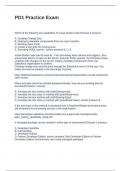Exam (elaborations)
PD1 Practice Exam with correct answers 2024
- Course
- Institution
Which of the following are capabilities of Visual Studio Code?Choose 3 answers. A. Creating Change Sets B. Deploying metadata components from one org to another C. Running Apex Tests D. Create a test suite for running tests E. Executing SOQL queries correct answers B, C, E Visual Studio ...
[Show more]



